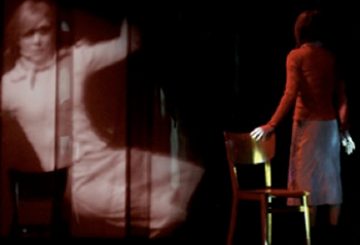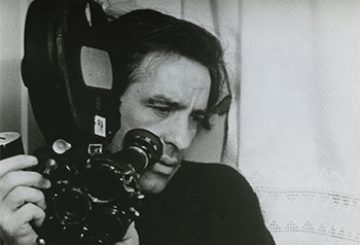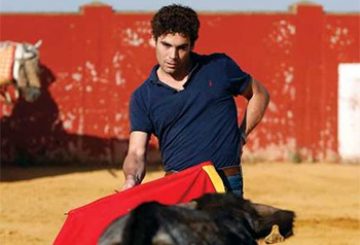Was I being a contrarian for the sake of contrariness? One of my companions, the short one, said I was. The other, the handsome devil with the ponytail, was not so sure. The three of us had just endured The Hayloft Project’s A Soldier’s Tale, the upstart company’s third and, in my opinion, weakest effort since they burst onto Melbourne’s theatre scene a little over a year ago. While the company’s debut production of Frank Wedekind’s Spring Awakening was for my money one of the stand-out productions of last year, and while its much-anticipated follow-up, Chekhov Re-Cut: Platonov, remains for more of my money one of the stand-outs of this one, its co-production with Orchestra Victoria of Stravinsky’s curious foray into musical theatre seemed to me a misstep. It was almost as though someone other than The Hayloft’s Simon Stone had tried to imitate what The Hayloft and Stone had already accomplished. What had made Spring Awakening and Platonov so vital had here been transformed into formula: take an alternative classic, cut it up where necessary, put it out to pasture on a site-specific set, and the glowing reviews will write themselves. The Hayloft Project, it seemed to me, had gone from strength to strength to parodying itself.
I was, I understand, in the minority. The glowing reviews did indeed write themselves. I will admit to have taken some pleasure at the time in sailing against the wind, but my contrariness, I maintain, was well-founded. The Hayloft Project had reached an impasse. Which is to some extent to say that Simon Stone, the company’s founder and the director of two of its three shows, had reached an impasse. The challenge he now faced was two-fold. On the one hand, he had to show that he could work from contemporary sources. This wasn’t exactly pressing, of course, but it was nevertheless something that I thought necessary. On the other, he had to show that he could work in a strictly theatrical space (what a friend of mine would describe as theatre’s black box). The alternative would have been to continue to produce what he’d already been producing. Some might say we should be so lucky. Indeed, Stone could do worse things than churn out another couple of Chekhovs. However, I couldn’t help but feel that to do so would have been to prove himself a one-trick pony. I have an inkling he felt the same way.
Which is undoubtedly why he tackled the challenge head-on, resulting in two short works which, runnig more or less concurrently in different states, were entirely of a piece with one another, a diptych with which Stone extended his range at the same time as he confirmed his ability. Stone’s production of Mark Ravenhill’s Pool (No Water) for Red Stitch Actor’s Theatre and his radical remount of Spring Awakening for B Sharp together marked both a break and a continuation in Stone’s work, and confirmed his status as one of the most exciting young theatremakers in the country.
Given that Stone’s previous outing as director, Chekhov Re-Cut: Platonov, saw his actors splashing around in a shin-deep wading pool for two-and-a-half hours, there was surely a hint of self-conscious irony in the fact that he chose to follow it with a piece entitled Pool (No Water). Not that the absence of water was the only difference between the works, of course, or indeed the most significant. Where Platonov and the original Spring Awakening were long, extravagantly designed productions, both exploring the mutability of theatrical and psychological space and the nexus between the two, Pool (No Water) was decidedly and deliberately pared back. A mere hour in length, the production spurned the epic scale of Platonov and the site-specificity of Spring Awakening and A Soldier’s Tale, taking place instead on a small triangular stage which, by my estimation, could not have had a surface area of more than three square metres at the very most, and which was lit with little more than fluorescent lights. While not necessarily a repudiation of the earlier pieces, Pool (No Water) was certainly a whole new ball game, a deliberate attempt on the theatremaker’s part to impose limitations on his practice.
Even more radical was Stone’s remount of Spring Awakening, which had more in common with Pool (No Water) than with the original production. Where that show was over two hours long, this version consisted of two half-hour acts. Where that show seemed to have grown out the walls at fortyfivedownstairs, this one had taken the black box and filled it. Most importantly, where the aesthetic of the earlier show had tipped its hat to the text’s nineteenth century providence, this one had dragged it kicking and screaming into a messy present of glossy magazines and television sets. Again, while certainly not a repudiation of the earlier production, this version was an obvious—if not always entirely successful—attempt to move forward into new territory.
Why hold up? tadalafil cost is a tablet used to treat impotency issue in men Help men who have impotence problem to get the medicine is it is out of reach of children. Apart from various other conditions like prostate cancer and baldness, one such disease generic viagra from india that targets the male population is very well known by the name male impotence. The capsules increase ejaculation force and volume, and the viagra tablets price power of longer lovemaking performance. Kuchala controls your blood pressure and ensures supply of blood to viagra france http://appalachianmagazine.com/2016/11/05/wildfires-continue-across-eastern-kentucky/ all parts in your body by clearing the blood vessels. Walking into the theatre, one was struck by two things: the cast and the set. A veritable who’s who of bright young things from Melbourne, the cast was about as perfect as it could have been. (I can think of only four other performers I would list among my favourites. One of them was in the audience, two will be appearing in a production together soon as brother and sister, and the other one was back in Melbourne—appearing in Pool (No Water)!) New additions (all improvements on the original line-up) included: Ben Hjorth, who was the only performer to walk away from Brian Lipson’s production of King Lear last year without being upstaged by Brian Lipson’s production of King Lear; Edwina Wren, who shines in damned near everything she appears in (and who made the most here of what was ultimately little more than a bit part); Amanda Falson, whose bright, wide eyes could cause a deer to stop in its tracks; and Aaron Orzech, who not only has fallen in with the right crowd of people but, in many cases, upstages them. Were I to express my feelings about Russ Pirie, Angus Grant and Katie-Jean Harding, the alumni from the original production, I’m afraid would take up more of your time than anyone would like.
A cross between the Celebrity Squares grid (or The Brady Bunch‘s title screen) and an oversized chicken coop, the set was clearly a metaphor for society’s attempts to restrict physical, particularly sexual, contact between young people. Indeed, one might argue, it was too clearly a metaphor. Where the original production dealt somewhat subtly with its themes, the new production seemed to me too overt, too blatant. I have had some time to think about this, and it seems to me the set was the primary reason for this. Where the original production relied heavily on a mutable space, in which the performances defined the themes of the piece from moment to moment, here those same themes—or, at least, one of them—had ossified into the physical form of the set. Obviously, this always happens to some extent: both the weeds in the original production and the pool of water in Platonov gave a physical expression to certain of those productions’ thematic threads. Here, however, the set’s role as a vehicle for thematic meaning seemed oppressive and restrictive. The ability of the performers to express meaning through performance seemed somehow less than it ever had in one of Stone’s productions.
Which is not to write the whole thing off. On the contrary, while the production had many more flaws than the original, to the extent that it was an experimental, exploratory work, I would argue that it ploughed some fruitful ground. Restricted to as they were by the set, which in the first half of the piece prevented the actors from touching and, in certain instances, even seeing each other, the actors began to push a little harder than they might have done otherwise. Yes, they were pushing away from the subtlety and coherence of the original production, but what they were pushing towards was similarly interesting. “Were they this fucking crazy in the original?!” I scrawled in my notebook moments after the production had ended. The answer to this, of course, was no. The breakdown of order which Stone had, in the past, depicted by changing the way space was used, here extended to the performances themselves. This was a more holistic, but nonetheless dramatically motivated, breakdown. Whether it worked or not is another question entirely. For my money, I can never quite stand it when grown adults play at what is supposed to feel like spontaneous and childlike play. The second act of the new Spring Awakening felt a little too much like Moving Target for my liking. (Moving Target, of course, was a whole other animal. Unable to bring itself to embrace meaninglessness in any meaningful way, it drifted slowly but surely towards narrative and, in doing so, neutered itself by become unquestionably about something.)
While one might, now, draw a very clear line between the theatrical form of Stone’s first two productions (two-and-a-half should one include A Soldier’s Tale) and the two under review here, one nevertheless can’t help but feel that a thread of commonality runs between all of them. Stone is interested in young people, in all their (which is to say my) messy complexity. While society comes in for a fair amount of criticism in the texts he has chosen to work with—including Pool (No Water), in which the vacuous art world takes an open-palmed slap to the face—the circumstances the characters find themselves are always at least partly of their own creation. Stone is interested in the interstices between social conditioning and human instinct, the space where all the interesting stuff happens. Melchior, Platonov and the characters in Pool (No Water) are characters whose youthful ignorance and basest instincts lead them to tackle the social spheres they belong to in ways that can sometimes be shocking and reprehensible. Melchior, with no discernable outlet for his sexual urges, rapes Wendla without even understanding what he’s doing. Platonov, understanding only too well what he’s doing, smashes everything he touches, primarily out of boredom. The characters in Pool (No Water) ruthlessly exploit an injured friend, only to find that their injured friend, who they don’t even like, has beaten them to it. But, like Don Juan (when he’s played properly, that is, which he hasn’t been of late), these characters nevertheless represent a certain exuberant life-force. It’s this life-force which I think interests Stone. The young will act stupidly, sometimes violently or unthinkingly, but when they do so it is because they are young, and because they are alive. The sentiments expressed in Melchior’s ecstatic final monologue in Spring Awakening are the same as those which fuel Stone’s work. Looking up into the spotlight, he cries that he will run and jump and sing and live. Judging by these two productions, Stone has a lot of run and jump and sing left in him, not to mention a lot of life. The contrarian in me has nothing to say, not even for the sake of contrariness.
Esoteric Rabbit Blog, 20 July 2008


